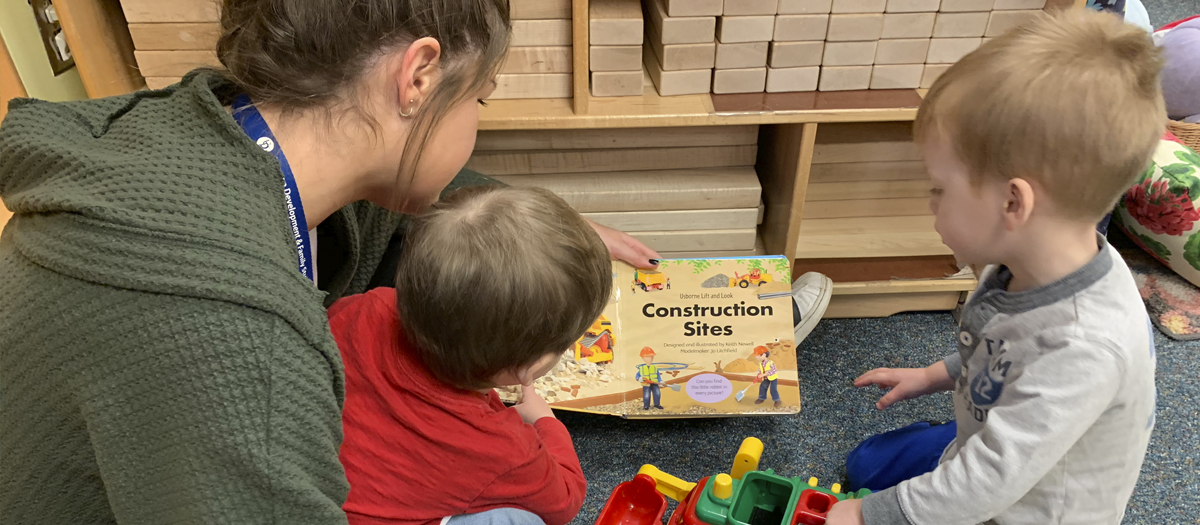Lab School

UD Students
The Lab School serves as the lab for the academic program of the Human Development and Family Studies (HDFS) Department within the College of Education and Human Development (CEHD) at the University of Delaware.
The Lab School serves as the translational laboratory for teaching, learning, and research for HDFS students and students and faculty across the University. Here, the Lab School teachers help translate theory into practice while teaching University students, supporting research, and providing exemplary education and support for young children and their families. The goal for students enrolled in the early childhood program is not just to become outstanding early childhood professionals but to be prepared to address the most pressing social and educational issues of our time.
Each year, the Lab School provides field placement experiences for more than 300 UD students preparing to enter fields of education, human services, psychology, social work, medicine, and more.
Students need to see and discover what is possible. Students need to not just be placed in high-quality early childhood education programs, but to be engaged in the process of discovering and analyzing possibilities. Students must have opportunities to directly experience and become involved. The Lab School is first and foremost an innovation lab supporting the growth and development of University students while serving children, families, and the community.
To become change agents, students need opportunities to be innovative and utilize what they are learning in core courses to address the unique learning needs of children.
Students need to be inspired by experts in the field who engage in cutting edge practices, model community outreach, and engagement every day. Through innovative practices, ongoing advocacy, and support the Master teachers inspire students to become early childhood educators who strive for what can be.
To understand and identify what is possible, students need time to think critically and creatively with experts. Engaging in ongoing reflection and analysis with the Master Teacher is a priority at the Lab School. Time is built into each schedule so that Master Teachers model for students the process of reflecting on their own practice in order to better understand what is working and what is not, to identify influencing factors and connections to evidence-based practices, and to guide decisions. Master Teachers place a high priority on helping students grasp this foundational practice.
How Master teachers support students each teaching day:
- Pre-session – At the start of each day, Master Teachers and Coteachers engage their teams in a discussion focused on helping students understand the intentionality behind the plans for the day ahead.
- On the floor – Students are encouraged to interact with all children to make sure students gain knowledge of how to teach, play, and learn with children requiring modifications and accommodations to their learning. Students Teachers receive hands-on experience leading small groups, co-teaching, and putting into practice what they have learned in their courses. Students receive individualized support and guidance to feel confident and successful and help them become successful educators prepared to meet the needs of children and families
- Post-session – At the end of the placement, students meet with either the Master Teacher or Coteacher to critically reflect on the day. In an environment that is a safe space for sharing, students feel encouraged and supported to share feelings, observations, or questions and have opportunities to connect experience to course content.
To ensure students are making progress on key learning outcomes, Master Teachers, Coteachers, and the Director work together to support students’ progress. The Lab School is a living, breathing laboratory for the undergraduates who are making connections between what they learn in their courses and real-life teaching for the very first time.
- UD undergraduates complete several guided observations at the Lab School as part of the course HDFS 221: Child Development II. These observation experiences contribute to their study of the cognitive, social, emotional, and physical development of young children.
- All students majoring in Early Childhood Education (ECE) complete a semester-long practicum experience at the Lab School as part of the course HDFS 224: Practicum in Inclusive Curriculum, Birth-Grade 2 typically during their sophomore year. They are part of the teaching team and work with small groups or individual children weekly under the close supervision of the Master Teachers.
- Students majoring in Human Services often complete 50-hour internships at the Lab School as part of HDFS 334: Experiential Education. Depending on their interests and the needs of the school, students spend about 5 hours per week working with small groups or individual children under the close supervision of a Master Teacher in one of the classrooms or in the art studio.
ECE students may return to the Lab School during their senior years to complete one of two required twelve-week Student Teaching experiences, as part of EDUC 400. Student teachers are responsible for phased-in curriculum planning and implementation, ongoing assessment, and work with families under the close supervision of the Master Teachers.
Student Teaching offers Seniors opportunities that they have not experienced before at the Lab School. These opportunities prepare them for next steps in their professional career whether it be teaching, leading, or attending graduate school.
Student Teaching at the Lab School provides students with:
- Time that is built into the daily schedule for one-on-one coaching and mentoring by clinical educators with many years of experience tailoring their support to individual teacher candidates
- An opportunity to become a full member of the Lab School staff as co-teacher and collaborator participating in all school activities
- Flexibility to develop a child-centered, developmentally appropriate activities and shape the classroom curriculum
- Opportunities to engage in research and scholarship that might lead to presentations and publications with the clinical educator
- Opportunities to become a teacher-leader and learn to support early field placement ECE students and non-major interns
- Opportunities to assist in developing cutting-edge practices in the field of Early Childhood Education
